- Home
- Marie Rutkoski
The Celestial Globe: The Kronos Chronicles: Book II Page 11
The Celestial Globe: The Kronos Chronicles: Book II Read online
Page 11
It would be a fine thing to outwit John Dee.
THE BOAT SLIPPED through the fog and Petra watched swans glide past in the blackish water of the Thames.
The oarsman noticed. “You’re thinking that them birds would make a tasty meal, aren’t you, lass? You oughtn’t. They belong to the queen.”
“I was thinking that they’re pretty.”
He shuddered. “Mean creatures, and strong. They’d break your arm if you let ’em.”
“I paid you to row, not talk,” ordered Walsingham. “We’ve wasted enough time.”
“I doubt the West will be any deader when we arrive,” said Dee.
“Oh, the West this and the West that,” Petra said impatiently. “Isn’t his name Gabriel Thorn? Is the West some sort of nickname?”
“No.” Walsingham was offended, though Petra didn’t see why. “It’s more of a title. A way that the queen’s council shows respect for its most important members. It’s—”
“A nickname,” said Dee.
“There are thirteen members of the council.” Walsingham turned to Petra. “I am one of them. Dee is another. But throughout Queen Elizabeth’s reign, there have always been four members whose voices have more weight. They are her North, South, East, and West. Robert Cecil became the North when his father, who used to hold that position, died. Francis Drake recently became the East. He’s a great favorite with the queen.”
“Who’s the South?” Petra asked.
“He is.” Dee nodded at Walsingham.
Petra looked at Dee, wondering why he wasn’t one of the queen’s favorites, and how he felt about it.
“So the West is dead,” she said. “Big deal. Why are we rowing through the freezing fog?”
“Well, I don’t know why you are,” Walsingham told her. “But we are going to Whitehall because the queen requested our presence.”
“I gather, then, that Gabriel didn’t die in his sleep,” said Dee.
“You’re taking the news rather coolly,” said Walsingham.
“And how should I take it?”
“I just thought you’d care, one way or another.”
Petra snorted. “He doesn’t care about anything but himself.”
Walsingham was shocked. The oarsman suppressed a smile. Dee’s expression didn’t change. For a moment there was no sound but the dipping of oars in the water.
Walsingham cleared his throat. Ignoring Petra, he said to Dee, “A servant found the body in the palace library. The corpse was a little stiff, but not totally rigid. The West can’t have been dead for more than a few hours. I’ve already inspected the body, and there are no signs of any struggle. He has no bruises on him.” Walsingham shrugged. “Gabriel Thorn was too great a lover of wine. I’d say the old man’s heart just gave out.”
“Yet the queen ordered you to send for me,” said Dee. “And you were anxious that I come.”
“The queen says jump, I jump. So do you. The death seems natural, to be sure, but you’re supposed to confirm it.”
“Here we are,” said the oarsman. Behind him, a covered dock appeared out of the mist. It looked like a little wooden house jutting over the water. The oarsman rowed the boat to a set of stairs leading out of the house and down to the river.
A servant skipped down the steps to offer his hand. The two men got out of the boat, and began walking up the stairs when the servant reached to take Petra’s elbow. She jerked away. “I don’t need help.” But the river looked dark and cold. She hoped she wouldn’t slip. She stood up.
“Stay a moment, my lovely lass,” the oarsman said.
Petra turned to look at him.
“You’re a bold one, I can tell. And them silver eyes of yours seem awful deep. Mine’ve seen a lot, too, rowing from one bank to the other. Take my word: don’t go poking around politics, especially when there’s already one dead body. Men like that”—he jerked a thumb at the cloaked backs of Dee and Walsingham, retreating into the dockhouse—“they’re swans. They seem grand. Give ’em cause, though, and they’ll fly at you. They’ll break you.”
“I know,” said Petra. She planted her foot firmly on the stairs and stepped out of the boat. “But thanks for the warning.”
PETRA FOLLOWED DEE and Walsingham down a long hall crowded on either side with small, decorative shields. She leaned forward and rapped a knuckle against one.
“That’s not a toy.” Walsingham knocked away her hand.
“It’s made of pasteboard! I didn’t break it, and wouldn’t mind if I did!” Petra was tired of being bullied, and was just about to say so when Walsingham spoke again:
“She’s a little savage, John. She has no manners—or, if she does, they’re bad.”
“She’s curious,” Dee said. “It’s part of her charm.”
“Francis,” called a hunched man waiting at the end of the hallway. “A word, please.”
As Walsingham walked away, Dee explained the meaning of the colorful shields. “They’re gifts to the queen from her knights. Notice the various animals and trees. They are symbols that refer to a knight’s family. As you see, each shield bears a short poem that either brags about the knight’s status, praises the queen, or does both. Walsingham’s shield is somewhere on this wall.” He waved a hand.
“Where’s yours?”
“Nowhere. I am not a knight, nor will I ever be.”
Petra examined him. He didn’t seem to mind being passed over by his queen. She looked at the shields—they were bright, flashy. They called attention to themselves. Dee didn’t. But Petra thought Dee was probably more powerful than a dozen knights with silly pasteboard shields.
He stood patiently.
Petra ignored him, walking down the hall, studying the shields. One of them caught her eye. The shield showed a tree, and dangling from its branches were socks, scarves, hats, coats, trousers, and dresses. Beneath it were these lines:
To My Queen
My finest cloth shall dress your land
And warm it ever at your command.
Dee looked over Petra’s shoulder. “A wretched poem, though there are worse.”
“Whose is it?”
“It belongs to Sir Robert Cotton. The entire shield plays on his last name. Cotton, cloth, clothes—”
“I get it,” Petra interrupted. Then a thought struck her. “Ariel. She talked about a tree dressed in robes, just like the picture on the shield.”
Dee glanced at Petra, and his face held a new expression. It almost looked like respect. “Yes.”
“But what does that have to do with me?”
“I don’t know,” Dee said abruptly. “Ariel mentioned a great deal of things, including the possibility of murder. And here we stand, ready to view Gabriel Thorn’s body. We—you, especially—would do well to consider Ariel’s words.”
What else had she said? Petra remembered the spirit’s warning to Astrophil: Never trust a poet. Petra’s gaze swept down the corridor, over the two-line scraps of verse on each shield. There were hundreds of poets here.
Dee asked, “Would you like to find out why I brought you to Whitehall Palace?”
She did. She couldn’t help it. But she lied. “No.”
“That was a rhetorical question,” said Dee. “Follow me.”
WHITEHALL PALACE SPRAWLED. Petra was used to the splendid but simple form of Salamander Castle, with its square-shaped rooms and orderly hallways. Whitehall felt alive, as if every night, while its occupants were sleeping, it sprouted another room that grew at an impossible angle.
Petra followed Dee into a chamber with a high, vaulted ceiling. She felt swallowed up by the space. “What is this place?” she asked, and her words echoed.
“The Watching Chamber,” Dee replied. “Balls are held here.”
“So it’s for dancing, not watching.”
He glanced at her over his shoulder. “There is always someone watching.”
Dee led her down a corridor. At the end was a closed door, in front of which stood Walsingham and the ma
n with the hunched back, who gave Petra a keen but not unkind look. “Who is this?”
“My ward,” Dee replied.
“I’m Robert Cecil.” The man took Petra’s hand and gently patted it. “I think you should wait here. A dead body is not a proper sight for a young lady.”
“I agree,” said Walsingham.
“I don’t,” said Dee. “Petra is here to assist me.”
“I am?” Petra asked.
“I’ve had enough of your eccentricities, John,” Walsingham said. “I’m off to the kitchen to question the servants. I doubt that you and your little assistant will discover anything new about the body. But try, by all means.”
He walked away, his shoes clapping against the stone floor.
“He’s a competent man,” Robert Cecil said, watching Walsingham go. “But the queen requires your opinion on the death of the West, John.”
The three of them stepped into a library. Leather bindings, mostly in red and green, gleamed on the shelves. Astrophil would have been awestruck, but Petra felt disappointed. She was wondering why, when she realized that there was nothing remotely magical about Whitehall Palace—not like Prague’s castle, which overflowed with glorious objects and enchanted rooms. This palace made Petra wonder what it was hiding.
Then she saw Gabriel Thorn’s body slumped in a chair.
“He was here from ten o’clock until about eleven o’clock in the morning,” said Cecil. “He had reserved the library for his private study. No one came in, as far as we know.”
Dee studied the body, looking carefully at the face and mouth. “Petra.”
She stayed by Robert Cecil’s side. The body’s skin was already gray, and it seemed to Petra that her scars burned.
“There’s nothing to fear from a dead man,” Cecil said gently.
“That is not always true,” said Dee. After this discomforting statement, which did little to make her forget about the Gray Men, Dee ordered, “Petra, come here.”
Not wanting him to think she was nervous, she did.
“Many poisons are metallic,” Dee began.
“I know that,” Petra snapped. “Do you think my father wouldn’t have warned me about the dangers of metal?”
“Then put that knowledge to good use and tell me if anything about Gabriel Thorn looks unusual.”
“He looks dead.”
“Very insightful, my dear. If your eyes have learned so much, imagine what your touch could do.”
Petra recoiled. She understood what Dee was suggesting. She remembered Tomik asking her to hold the Glowstone and guess what kind of metal it contained. She slipped her hand inside her pocket and wrapped her fingers around the only thing, besides Astrophil and her father’s sword, that she had left of her home. She didn’t squeeze Tomik’s Glowstone, just felt its smooth shape. She often clung to it when she was lonely.
Or afraid.
“I’m not touching a dead body,” she stated.
“You do not have to, if it is too distressing,” Dee said. “By all means run away and hide.”
Petra knew that what he said was a trick, but it worked anyway. She wanted to be brave, and she began to wonder if Dee was correct about her magical gift. Maybe she was special.
She found herself stepping forward. Quickly, before she could change her mind, she laid her palm on Gabriel Thorn’s wrinkled forehead. It was cold and hard.
“Don’t think about what you’re touching,” Dee said. “Think about what it holds.”
Petra remembered the Thames, and how opaque the waters were. Somewhere below the river’s surface was a bottom—muddy, old, and far from the sun. She forgot about the curve of the skull beneath her palm.
The image of a bright, twisting liquid floated in Petra’s mind. She recognized it. “Quicksilver.”
“Good,” said Dee. “Keep your eyes closed.”
She hadn’t realized that they were.
“This will be more difficult,” Dee continued. “Can you tell me how long the quicksilver has been inside the blood? A long time? Since late this morning, or early?”
Petra’s lips automatically formed the answer: “A little after ten o’clock.”
“That’s enough.” Dee lifted her fingers from the West’s forehead. Petra snatched her hand away, and cradled it in her other palm. It was cold. She blinked at Dee, and the world felt unsteady.
“It is, of course, only her word,” Robert Cecil said.
“I’ll take it,” Dee replied. “What Petra says is consistent with certain signs on the body. Notice how pink Gabriel’s cheeks are.”
“That could be from wine.”
“True. He does smell of it. But then, where is his bottle? Where is his glass? If nobody entered the room, these items should be here.”
Cecil was silent.
“Gabriel’s mouth and gums are also a bright red,” Dee continued. “This, and the high color of his cheeks, are symptoms of poisoning by quicksilver.”
Cecil sighed. “I’ll tell the queen.”
“The key, I believe, will be discovering why Gabriel reserved the library this morning, and if he was indeed alone.”
Cecil passed a weary hand over his forehead. “How distressing. Gabriel wasn’t always well liked, but it’s difficult to imagine that anyone would wish him dead. Well, except . . .” He glanced at Dee, and then cleared his throat in embarrassment.
Except you. Petra was sure that’s what Cecil had been about to say. She remembered Walsingham’s comment to Dee: I just thought you’d care, one way or another. Was Dee glad that the West was dead?
With the face of someone eager to change the topic of conversation, Cecil said rapidly, “Now, John, while I have you here, would you be so good as to look at a draft of a law being considered by Her Majesty? I’d like to know your thoughts on it before the council meets.” He led Dee to a table near a window, and pulled a sheaf of paper in front of them.
As the two men leaned over the table, Petra stepped away from the West’s body. She didn’t want to linger near the corpse, but she thought about what Tomik would do in a situation like this. He would be thorough. He would look for something that everyone else had missed.
Petra glanced down at the thick carpet, and saw a tiny, tear-shaped seed by the leg of the chair. She bent down and picked it up. It looked like an apple seed, except it was a dusky orange, not brown.
Petra put it in her pocket and felt a sense of satisfaction. She had noticed something Dee hadn’t.
Still warm with the glow of this small triumph, Petra decided to act upon a sudden idea. After a glance at the two men, who were engrossed in conversation, she scanned the shelves until she found what she wanted: a small, compact book on English grammar. She tucked it under her arm, then carefully pulled the cloak around her shoulders.
Petra Kronos had stolen from the queen of England. Astrophil would be pleased, and Neel would be proud.
DEE WAS QUIET as the oarsman rowed him and Petra away from the dockhouse. The fog had lifted, and Petra could now see the palace and the fields of dead trees around it.
It was colder than before, and snow began to fall. Petra shivered under her cloak. The silence made her uncomfortable. She was bursting with questions, and finally she couldn’t resist. “Why did you bring me to Whitehall?”
“You might have thought Ariel’s words were nonsense,” he answered, “but I never did. When Walsingham came to Throgmorton Street with the news that a councillor was dead, I recalled Ariel’s prediction of murder. That warning came when I asked the spirit about you. Clearly, the death of the West is connected to you in some way.”
The chilly feeling that crept over Petra had nothing to do with the cold. “But I didn’t know Gabriel Thorn.”
“That may not matter.”
“Did he know the prince?”
Dee paused before replying. “I do not think so. I don’t yet understand why Gabriel died, or what you have to do with that fact. But events at Whitehall confirmed my suspicion that Ariel’s wor
ds about you were not random. In the Shield Hall—”
“The Cotton tree,” Petra supplied. “The tree dressed with robes.”
“Yes. And then there was the dirty metal river.”
Petra looked at him blankly.
“Think, Petra.”
She remembered the quicksilver, a liquid metal that flows without being heated. “But quicksilver isn’t dirty. It’s shiny.”
“It’s poisonous. That is dirty enough.”
“Oh.” She didn’t speak for a moment, then lunged into a question that had been bothering her. “Why haven’t you been giving me lessons?”
“I just did, in the Whitehall library.”
“But you didn’t before. You’ve been ignoring me.”
He didn’t give the response that Petra expected. Dee didn’t say he had been busy. Instead, he replied, “The unfortunate thing about being a teacher is that it is impossible to make a pupil learn something if she doesn’t want to do so.”
Petra heard herself saying, “But I do want to.”
His eyebrows lifted.
“I mean,” she amended, “I might want to. But nine months is too long.” It had always been too long, but Petra had made that agreement thinking she could escape well before the end of that period.
“Anything worth learning takes time,” Dee said.
“I don’t have time.”
“Then what do you propose?”
Petra considered the things that she knew about John Dee. He enjoyed bargaining. He constantly challenged Petra, whether by mocking, tricking, or entrapping her. He seemed (Petra forced herself to admit it) intrigued by her. He might care about the death of the West, and whatever Petra had to do with it.
“I propose,” Petra began, “that we stick to our original agreement. Except—”
“Except?” He was amused.
“Except that if I solve the mystery of who killed Gabriel Thorn, you will send me home to Okno right then and there. With all of my possessions,” she added, thinking of the sword.
Dee laughed.
“And,” she added, “you will break the link between our minds.”
“That part is not negotiable. A mental link like that can be broken only by the person who forged it, or by whoever owns the minds that are connected. I will not sever that link, which means that you are the only one left who can. Somehow, I don’t think I will be teaching you how to do that.”

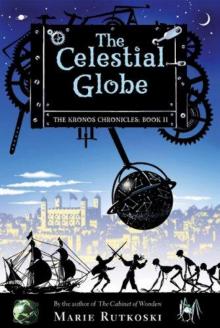 The Celestial Globe
The Celestial Globe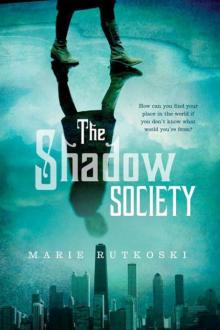 The Shadow Society
The Shadow Society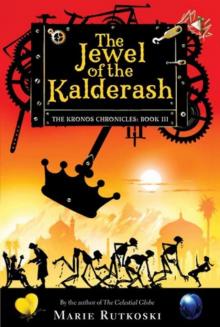 The Jewel of the Kalderash
The Jewel of the Kalderash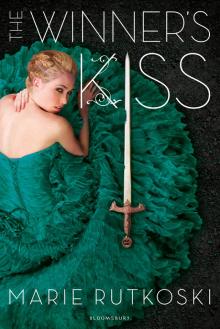 The Winner's Kiss
The Winner's Kiss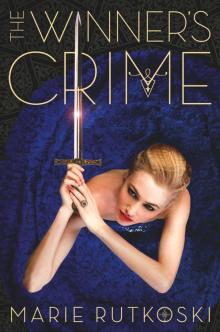 The Winner's Crime
The Winner's Crime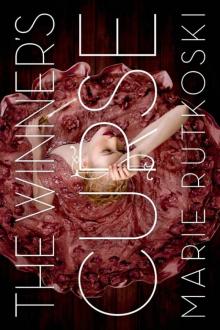 The Winner's Curse
The Winner's Curse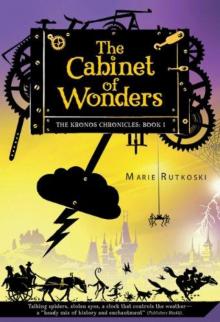 The Cabinet of Wonders
The Cabinet of Wonders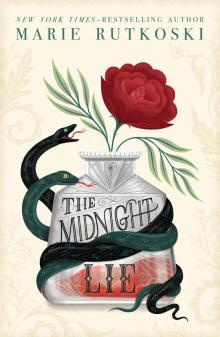 The Midnight Lie
The Midnight Lie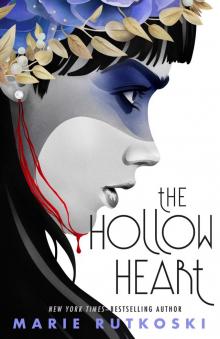 The Hollow Heart
The Hollow Heart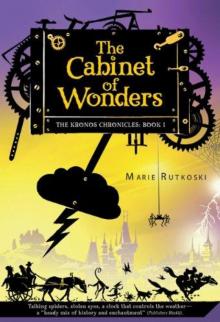 The Cabinet of Wonders: The Kronos Chronicles: Book I
The Cabinet of Wonders: The Kronos Chronicles: Book I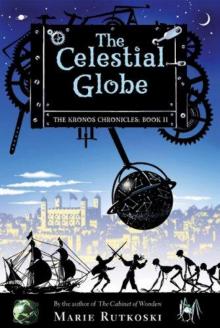 The Celestial Globe: The Kronos Chronicles: Book II
The Celestial Globe: The Kronos Chronicles: Book II